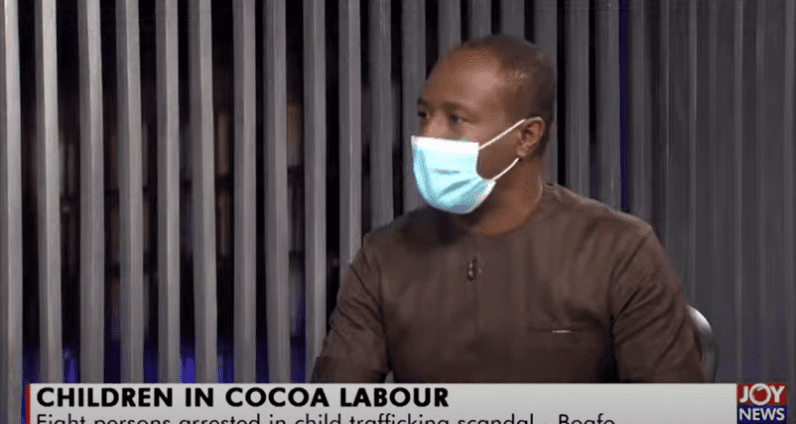The Head of Public Affairs of the Ghana Cocoa Board, Fiifi Boafo says it will be disingenuous to allege that the Board has failed to protect children from child labour within the Cocoa industry.
His comments were in reaction to JoyNews’ Hotline documentary, ‘Children in Cocoa Labour’ which revealed how traffickers hired out children, including 10-year-olds to cocoa farmers for as little as GHC800 to work for a full year, weeding and carrying cocoa beans.
The recent happening has triggered a lot of discussions on the abuse of the rights of children, particularly in the Cocoa sector.
Meanwhile, eight farmers who were captured in the Hotline documentary using children as labourers on their farms have been arrested.
Speaking on JoyNews’ PM Express, Fiifi Boafo noted that there have been several programmes and interventions carried out by the Ghana Cocoa Board to eradicate the canker of child labour from the sector.
“You see our engagement with farmers is something that goes on on daily basis. There may be signs and signals that give you an indication that maybe there’s something wrong happening somewhere, based on that you take actions to remedy the situation,” he said.
However, he conceded that these interventions may not be foolproof and once in a while incidents such as was captured in the JoyNews documentary go unnoticed under their radar.
Nonetheless, he stated that this was not justification enough to claim that the Board’s interventions have been a complete failure.
“But the conclusion, that well it’s a failure on the part of our monitoring system, I wouldn’t want to agree with that. Because there’s a possibility that something may pop up somewhere else, but what is the percentage of that in totality. Yes, this has come up, it’s an indication that the system is not foolproof but it does not also mean that the system has failed,” he said.
He stressed that there are several statistics and indicators to prove that the Board’s interventions have been largely successful in rescuing children from farms.
Some of these indicators, he said, “show that indeed enrollment has increased, number of children in school compared to what it used to be has changed.”
“There’s one thing we need to all understand, if the child is in school, the likelihood or the possibility that the child will be involved in child labour is lower. Because if the child is already in school, at what time will the child be in the farm.
“So the statistics and the programmes and the interventions clearly demonstrate the fact that we cannot say that well we have failed, we have not lived up to the expectation. It’s still an indication that there is some work to be done but we should not in any way conclude that we have failed and all the interventions and the efforts put in have not yielded any results,” he said.
Latest Stories
-
New framework offers hope for sustainable management of West Africa’s climate-stressed lagoons
14 minutes -
FirstBank Ghana MD urges students to join Junior Internship Programme
19 minutes -
Chief of Staff urges NACAP II team to tighten the fight against corruption
21 minutes -
National Adaptation Plan is Ghana’s blueprint for climate resilience – Climate Activist
29 minutes -
MIT Africa Business Challenge: A triumphant start and a bold vision for 2026
35 minutes -
ADB celebrates 60 years with health walk, eyes top 3 spot in Ghana’s banking sector
52 minutes -
The holiday that refused to die: Republic Day’s strategic resurrection
2 hours -
My galamsey ventures
2 hours -
Kumasi to get machinery park – 24H Economy Secretariat
2 hours -
NSMQ2025: St. James Seminary flexes national pedigree with big zonal win and riddle bonanza sweep
2 hours -
ECG assures stable power supply at KATH to improve healthcare delivery
2 hours -
NPP desperate to avoid defeat in Ablekuma North re-run – Omane Boamah
2 hours -
FirstBank Ghana launches 2025 internship to develop the next generation of leaders
2 hours -
Up from UPSA – whose nudity is naked?
2 hours -
Martyrs Day: Legal practitioners urged to uphold justice without fear or favor
2 hours

